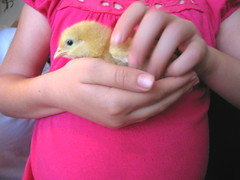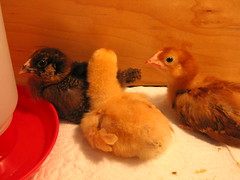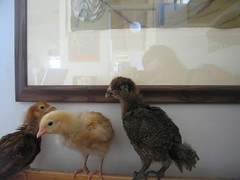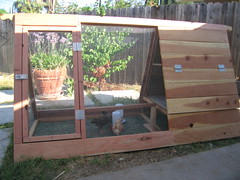
So the chickens have been with us for over a year now. We love them. A friend recently compared them to having three poodles - and they weren't really far off. They follow me around the yard, stand by the backdoor begging for a treat, or to be let in, (they aren't - at least not often) and one of them in particular loves to be held. Our pullets have grown into hens, and two are currently experiencing their first molt. (Which involves the loss of feathers and decrease in egg production while all their energy goes into a glossy new coat.) It is wonderful!
So what do you need to know? This is by no means comprehensive, and I strongly encourage further reading of any / all of the resources listed at the end.
Is permission from your city required to have them?
More and more cities are allowing homeowners to keep backyard chickens. In Los Angeles, we are lucky to live in an area zoned for agriculture (not all neighborhoods are) and we are allowed to have a flock, with the only caveat being a "distance requirement". Hens are to live 20 feet from our residence and 35 feet from our neighbors residence (not the property line) and if we had a rooster, that would change to 100 feet from our closest neighbor. (To learn more about local codes, there is a good starting point over at The City Chicken - but do make sure to find out what your city, or neighbourhood, allows before buying your chicks.) **Yesterday Los Angeles passed a new law limiting the number of roosters kept in the City to one, without a permit.**
Don't you need a rooster to get eggs?
No! You only need a rooster if you want chicks.
How long do hens live? and how long do they lay?
My reading tells me that they can lay consistently for up to five years. They live (and will lay sporadically) for eight or more.
What are the costs?
Our chicks were under $3 each to purchase. The coop was more of an investment - but we are lucky that D is a carpenter and could build it in-house. Their feed is an on-going expense (and like everything, more expensive if you go organic). You should also consider veterinary pills, should a chickens become ill, or injured.
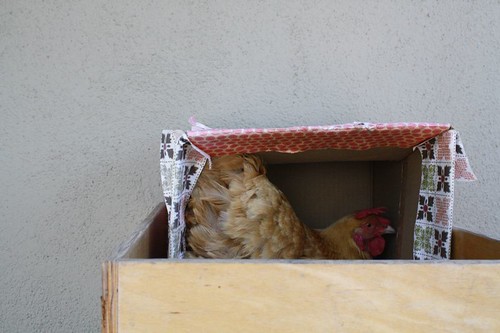
How much space do chickens need?
In my research, a rule of thumb seemed to be that each chicken should have at least 10 square feet of yard to run around in, and 4 square feet of hen house. They also need a nesting box (our three share a 4 ft sq box within the hen house), seem to like a place to perch (not too high, and wide enough to comfortably support their feet), and a spot for a dustbath. (I'll add that I don't think the nesting box is necessary - but makes it easy for us to know where to look for eggs. They like a private spot, and have also been known to lay in cardboard boxes left in the yard, as well as on one particularly hot and uncomfortable day, right at my feet.)
How do you keep them safe?
In designing and constructing our coop, raccoons and possums (to which we have lost all our koi) were forefront in our thoughts. D made sure that the run of the coop was made from heavy cage wire (not "chicken wire" which isn't very strong) and that the hen house had secure doors and window. Raccoons are very good with their hands, so we have locks (simple carabiners) on all entries that go on every night. We are fortunate that I work from home, so the hens are usually found wandering the backyard through the day. I am always listening, and they have alerted me to intruders such as neighbourhood cats and ducks (who like our pool)with lots of clucking and wing flapping.
It is also important to protect them from plants that may be poisonous to them, as they like to nibble on most things green. Oh, and chickens can't swim. So if you have a pool or pond, keep this in mind.
Will D share his coop plans?
I'll ask him... He developed his plan from a lot of research on-line, and in the books listed below.
How do you protect them from the heat?
We live in a very hot area of Los Angeles (high of 103 today!) so this has been a major concern. (We have a close friend who tragically lost a hen to heat stroke this summer.) We can easily see the girls discomfort as the temperature rises and they begin to lift their wings and pant to stay cool. We hose down their area (and the one of them that likes to be sprayed) regularly on hot days - as well as keeping a supply of ice packs at the ready to cool the nesting box and under some of our trees where they will lie, and get some relief. It is also very important to have cool water available for them to drink. I have found that while cute, our hens aren't the brightest bulbs in the box and will often not go to drink when they are thirsty, but when I bring them water they are quick to take a sip.
What do they eat?
Our girls eat "laying pellets". It is recommended that a fully grown, laying chicken needs 5 oz of food / day. They forage instinctively (good-bye backyard bugs!) and also love treats from the kitchen (pasta, rice, fuits and veggies are good, but avoid anything salty, sugary, fatty, citrus or meat.) One of ours has even eaten a mouse. Because chickens don't have teeth, they rely on grit to digest their food. If they can't find small stones in their surroundings, grit must be supplied.
Do they eat everything in your garden?
Yes. And no. We are in an ongoing experiment to see what is "chicken friendly" in our yard. (ie. It is safe for the chickens to eat, but they aren't interested in eating it.) It has been hit and miss. They do seem do love crabgrass (good!), but also loooove my succulents (bad!). We had to put a fence around our vegetable garden to ensure the produce ended up on our table. (Though they don't seem to like tomatoes.)
Are they clean?
Like any pet, that depends a lot on your input. The birds themselves are very clean. They love to have a dustbath, and will take up in one of the flowerpots if not provided a spot. (Ok, to be honest, they may take up in a flowerpot anyway. I have lost a lot of plants to this.) They spend a lot of time grooming themselves, and unless you are showing them, do not need to be bathed. They void half of their poop in the night, so their coop does need to be cleaned regularly. (Aside from the daily cleaning we wash it out thorough with a teatree oil soap monthly, and we have dusted with foodgrade diatomaceous earth every six months as part of our pest-control management.) We also keep our food supply locked in a metal garbage bin at night to dissuade any rodents looking for an easy meal. The design of our coop allows us to move it around the yard, so one area does not become inundated with all things chicken. Their food and water receptacles also need to be cleaned regularly.

Ok, but what about the poop?
Yes, chickens poop. And sometimes it seems like a lot. We clean our coop and run every day, and the smell isn't evident. We line our hen house with shredded newspaper (only the non-glossy pages, printed with soy ink) and toss it, poop and all, into our composter. Chicken poop is rich in nitrogen, and makes for lovely compost. We haven't found a marked increase in flies - though I have heard others complain of this.

If you had to do it all over again would you?
Yes. No hesitation. I have been converted. While certainly not for everybody, they have been a wonderful addition to our family. And their eggs are yummy too!
Further reading / resources (again, by no means comprehensive):
On-line:
BackYardChickens
Green Frieda (I love their coop - which was featured last winter in the LA Times.)
Homegrown Evolution
One Block Diet (Sunset Magazine's blog)
The City Chicken
Urban Chickens
On the bookshelf:
Keep Chickens!
Keeping Chickens
Keeping Pet Chickens (great for my kids, ages 5 and 8. Lots of simply presented, important information.)
The Fairest Fowl(No info on keeping, but gorgeous photographs and information on various breeds - as well as an essay by Ira Glass.)
The Urban Homestead (you can get an autographed copy via their website: www.homegrownevolution.com)
In the neighborhood:
Los Angeles Urban Chicken Group (I'm excited about this and hope to make it to their next meeting!)
Happy Clucking!


